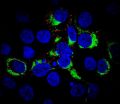(Press-News.org) A shared population of methicillin-resistant Staphylococcus aureus (MRSA) bacteria circulates both in humans and companion animals, according to a study published this week in mBio®, the online open-access journal of the American Society for Microbiology.
"Our study demonstrates that humans and companion animals readily exchange and share MRSA bacteria from the same population," says senior author Mark Holmes, senior lecturer in preventive veterinary medicine at the University of Cambridge in England. MRSA naturally lives on the skin and also causes difficult-to-treat infections in humans and animals. "It also furthers the 'one health' view of infectious diseases that the pathogens infecting both humans and animals are intrinsically linked, and provides evidence that antibiotic usage in animal medicine is shaping the population of a major human pathogen."
Holmes and colleagues sequenced the genomes of 46 MRSA samples from cats and dogs, collected between August 2003 and August 2007 from two large veterinary hospitals and several smaller veterinary practices throughout the United Kingdom. The samples were found to be similar to those associated with MRSA strains in humans, with most coming from wound infections or skin and soft tissue infections. Additional samples were from the animals' urine; cerebrospinal fluid; nasal wash or discharge; and bloodstream, heart valve or joint infections.
Comparing the samples to a global collection of human MRSA samples sequenced as part of other studies and evaluating the evolution of the bacteria, the investigators found that all animal infections fell in the same family: Epidemic MRSA 15 (EMRSA-15) (sequence type ST22), a common strain of MRSA first detected in the United Kingdom in the 1990s that spread throughout Europe. The bacteria were interspersed throughout the EMRSA-15 genetic family tree. Nearly all samples were genetically similar to human bacteria, and their place in the family tree showed that the companion animal bacteria most likely originated in humans.
Researchers also observed that samples from the same veterinary hospitals clustered together genetically, suggesting that as in human hospitals, MRSA can be readily transmitted in veterinary hospital settings.
"It's a reminder that constant vigilance and high levels of hygiene are just as important when treating cats and dogs as with humans," Holmes says.
Analysis of the genomes showed very little genetic discrimination between bacteria samples from humans and animals, indicating that the MRSA from cats and dogs had not undergone extensive adaptation to the companion animals, suggesting this type of MRSA has a broad host range. But the animal MRSA were significantly less likely than those from humans to have resistance to the antibiotic erythromycin, used rarely in English veterinary practices. Instead, these MRSA from animals were more likely to contain mutations making them resistant to the antibiotic clindamycin, used widely in veterinary medicine in the United Kingdom.
Holmes says pet owners don't need to worry.
"MRSA infection in cats and dogs is still extremely rare," Holmes says. "There is very little risk of owners getting ill from their pets." In addition, he says, healthy pets are not likely to pick up MRSA from their human companions but if a pet already is ill or its health is severely compromised, MRSA patients should inform their pets' veterinarians.
INFORMATION:
The study was supported by a Medical Research Council Partnership grant held between the Department of Veterinary Medicine and the School of Clinical Medicine at the University of Cambridge, the Moredun Research Institute and the Wellcome Trust Sanger Institute.
mBio® is an open access online journal published by the American Society for Microbiology to make microbiology research broadly accessible. The focus of the journal is on rapid publication of cutting-edge research spanning the entire spectrum of microbiology and related fields. It can be found online at http://mbio.asm.org.
The American Society for Microbiology is the largest single life science society, composed of over 39,000 scientists and health professionals. ASM's mission is to advance the microbiological sciences as a vehicle for understanding life processes and to apply and communicate this knowledge for the improvement of health and environmental and economic well-being worldwide.
Humans and companion animals harbor the same types of MRSA infections
2014-05-13
ELSE PRESS RELEASES FROM THIS DATE:
E-cigarettes and mental health
2014-05-13
Researchers at University of California, San Diego School of Medicine report that people living with depression, anxiety or other mental health conditions are twice as likely to have tried e-cigarettes and three times as likely to be current users of the controversial battery-powered nicotine-delivery devices, as people without mental health disorders.
They are also more susceptible to trying e-cigarettes in the future in the belief that doing so will help them quit, the scientists said. The FDA has not approved e-cigarettes as a smoking cessation aid.
The study will ...
Novel target found for chemotherapy-resistant leukemia cells
2014-05-13
Researchers at Children's Hospital Los Angeles have discovered that by targeting a particular receptor, chemotherapy-resistant cancer cells can be killed in an acute form of childhood leukemia, offering the potential for a future treatment for patients who would otherwise experience relapse of their disease.
Nora Heisterkamp, PhD, and colleagues at The Saban Research Institute of Children's Hospital Los Angeles have discovered that by targeting the B-cell activating receptor (BAFF-R), chemotherapy-resistant precursor B acute lymphoblastic leukemia cells (pre-B ALL) can ...
Older, sicker men with early-stage prostate cancer do not benefit from aggressive treatment
2014-05-13
Treating older men with early-stage prostate cancer who also have other serious underlying health problems with aggressive therapies such as surgery or radiation therapy does not help them live longer and, in fact, can be detrimental, according to a study by UCLA researchers.
The study followed the cases of more than 140,500 men aged 66 and older diagnosed with early-stage prostate cancer between 1991 and 2007 from the Surveillance, Epidemiology and End Results (SEER) Medicare database. Men who also suffered from multiple major medical conditions such as a history of ...
Study: Former prisoners, parolees turn to emergency departments for care
2014-05-12
AURORA, Colo. (May 12, 2014) – Being released from prison or jail is a difficult time for the millions of Americans returning to their communities from correctional facilities. Add to the list of challenges a high risk of winding up in the emergency department or the hospital. That's according to a new study from the University of Colorado School of Medicine.
The study, published in the Journal of General Internal Medicine, provides support for efforts to improve access to insurance and readily available health care for this vulnerable group.
"This study comes at a ...
Researchers find new molecule to treat asthma
2014-05-12
La Jolla, Calif., May 12, 2014 -- A new study carried out by researchers at Sanford-Burnham Medical Research Institute (Sanford-Burnham), the Max Planck Institute for Colloids and Interfaces (Germany), the Free University of Berlin (Germany), UC San Diego, and Shinshu University (Japan) has identified a novel molecule that prevents T-cells from orchestrating asthma brought on by allergens. The findings, published on May 12 in Proceedings of the National Academy of Sciences (PNAS), show promise for a new potent therapeutic agent to treat asthma, a chronic disease affecting ...
JAX researchers identify potential therapeutic target for wound-healing and cancer
2014-05-12
A Jackson Laboratory research team led by Professor Lenny Shultz, Ph.D., reports that a protein involved in wound healing and tumor growth could be a potential therapeutic target.
In one of nature's mixed blessings, the mechanisms that work to heal cuts and wounds, rebuilding damaged cells, can also go out of control and cause cancer. But understanding those mechanisms could lead to new ways of stimulating healing in wound patients and dialing back cancerous proliferation.
An inactive rhomboid protease, iRhom2, is normally a short-lived protein that controls a cascade ...
Airborne radar surveys and data-based models indicate West Antarctic Ice Sheet collapse is underway
2014-05-12
National Science Foundation- (NSF) funded researchers at the University of Washington have concluded that Antarctica's fast-moving Thwaites Glacier will likely disappear in a matter of centuries, potentially raising sea level by more than a half-a-meter (two feet).
Data gathered by NSF-funded airborne radar, detailed topography maps and computer modeling was used to make the determination.
The glacier acts as an ice dam, stabilizing and regulating movement toward the sea of the massive West Antarctic Ice Sheet. The ice sheet contains enough ice to cause another 3 to ...
Henry Ford researchers identify genetic factors that may aid survival from brain cancer
2014-05-12
DETROIT – A Henry Ford Hospital research team has identified specific genes that may lead to improved survival of glioblastoma, the most common and deadly form of cancerous brain tumor.
The molecular data is expected to aid further research into genes that either help or impede the survival of patients diagnosed with the tumor, which can invade and rapidly grow in any part of the human brain.
"Studies such as ours that help define molecular alterations associated with short-term survival likely will help define the reasons why our current treatments don't succeed in these ...
Researchers find a new gene expression mechanism of PRRS virus
2014-05-12
MANHATTAN, Kan. — A collaborative study involving Kansas State University researchers has discovered a new gene expression mechanism in porcine reproductive and respiratory syndrome, or PRRS, virus — an important swine pathogen that costs the U.S. pork industry more than $600 million a year. The discovery provides a new avenue for scientists to explore strategies to control and prevent the disease.
Ying Fang, Ph.D., associate professor of diagnostic medicine and pathobiology at Kansas State University, led a study that looked at the unique gene expression mechanism of ...
Hospitals ranked on complications after hip and knee replacement surgeries
2014-05-12
With an aging population comes an increase in hip and knee joint replacement surgeries, totaling almost one million procedures per year in the United States. To provide better information on the outcomes of these surgeries, help inform patient choice, and improve the quality of the nation's hospitals, a team of Yale School of Medicine researchers have developed a measure for hospitals based on the complications following their patients' hip and knee replacements.
The team published an article in the May issue of the Journal of Bone and Joint Surgery showing there are ...



